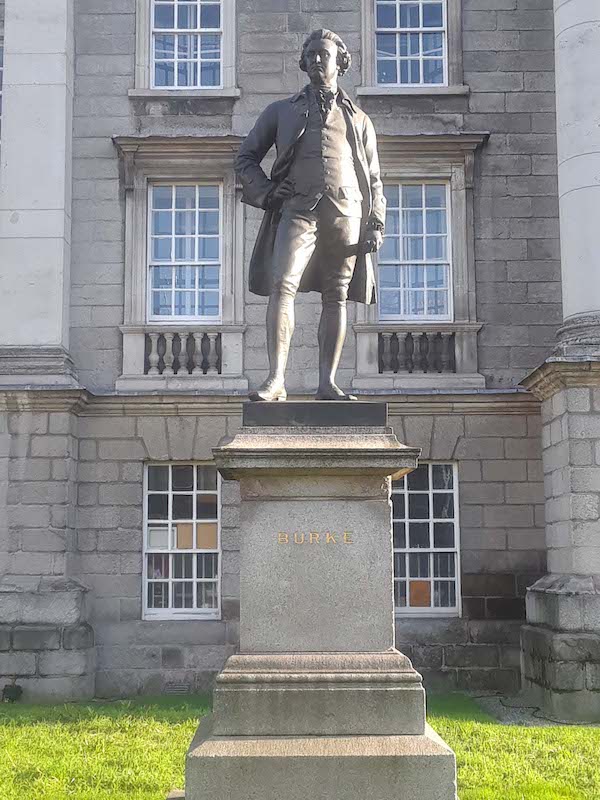History is full of exciting events, turbulent times, and violent change. But some revolutions can pass people by as they live through them, and can even be forgotten by those who were most affected by them. This is especially true of major constitutional revolutions: debates about constitutions can leave people quite unmoved at times.
In the summer of 1791, the future of Canada was being discussed in the British Parliament. What was decided in just a few days of debate was to determine what kind of place Canada would become, what the political and social characteristics of the new nation would be for generations to come. But even those making such important decisions, with few exceptions, didn’t seem particularly impressed by what they were doing.
After three thousand or so Loyalists settled along the shores of the Saint Lawrence west of the Ottawa River, they came under the system of government that had operated in the colony since 1763. Canada was Quebec, and stretched from the Gaspé to Lake Huron. The original French population, known simply as the Canadians, formed the majority of the population, even after the influx of English refugees. There was no Assembly to represent the views of the people. Land was held under the French seigneurial system, so the Loyalists found themselves unable to own outright the land they were granted. These new circumstances were unwelcome to them, and numerous petitions had been submitted asking for the “natural rights of British subjects”.
In 1789, William Grenville, Secretary of State for the Colonies, drew up a draft constitution to be introduced in Canada. Known as “The Quebec Bill”, it was not introduced into the British Parliament until early in 1791. The Bill provided for the division of Quebec into two new provinces, to be known as Upper Canada and Lower Canada, each with its own form of Assembly, land system, and civil laws. It came before the Committee of the House of Commons on May 6, 1791, to be debated and approved; but the session proved far more involved than anyone expected. One historian has noted that, of the 36 pages of debates on the Bill recorded in the Hansard for that session, discussion of the contents and its implications only filled three pages.
What has to be remembered about this debate was that it was not only dealing with the future of Canada, it was also taking place in the context of the unfolding Revolution taking place in France at the time. The Revolution had sparked a reevaluation of the role of the people in forming and carrying on their own government. It had sharply divided opinion in Britain, especially in the days before the execution of Louis XVI and his Queen, and the dark months of the Terror, the mass executions on the guillotine that disillusioned many of the Revolution’s early supporters.
The man considered one of Parliament’s finest orators and thinkers, the Irish philosopher, Edmund Burke, had condemned the Revolution from the beginning, and when he rose to address the House on the Quebec Bill on May 6, 1791, he was clearly conscious of the importance of what the House was about to do:
“They were going to exercise the most ample and extensive powers which one man or a community could exercise upon another. They were not going to make laws, but they were going to make and organize a body which should make laws. They were about to form a machine, an organ by which those people should contribute to their own happiness or their own misery. They had assumed to themselves a power of performing this act of sovereignty.”
This sums up perfectly the revolutionary and historic nature of what was being introduced to Canada. Perhaps it was this awareness, and how dangerous a precedent was being set in France, that caused him to launch into an attack on that Revolution, pointing out the dangers of choosing the wrong system of government for a people. In fact, Burke continued his vigorous attack on the Revolution for so long that other members, as well as the Chair, began to call him to order, without much success. The debate then largely turned into a loud and rancorous series of attacks on, and defenses of, the French Revolution, rather than a considered discussion of the Quebec Bill. What made the headlines, then and in history, was the manner in which the debate ended the long friendship of Burke and Charles Fox, who had been close allies in Parliament, and leaders of the opposition to the governments of William Pitt, for almost a quarter of a century.
The session ended shortly after order was restored, and debate on the Bill continued on May 11, with a more relevant focus on the actual contents of the Bill. It passed with only a couple of minor revisions, and was approved by the King in June. It came into effect in December, 1791, and Upper Canada, later to become Ontario, came into being for the first time. This revolutionary event in Canadian history arrived, almost completely overshadowed by the fierce arguments in Parliament over the French Revolution, and the subsequent parting of the ways between Burke and Fox. Even the people in the new province of Upper Canada were not to know about it until the following spring, when word finally arrived from London. Today, it is relatively unknown to most Canadians, who know little about the constitutional and social revolution that came about when the Quebec Bill became the first Constitutional Act in the country’s history.






